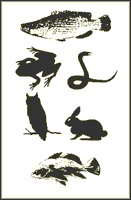Nebraska Cooperative Fish and Wildlife Research Unit

Nebraska Cooperative Fish and Wildlife Research Unit: Staff Publications
Date of this Version
2014
Citation
Myers, P.E., C.R. Allen, and H.E. Birgé. 2014. Consuming fire ants reduces northern bobwhite survival and weight gain. Journal of Agricultural and Urban Entomology. 30(1):49-58.
Abstract
Northern bobwhite quail, Colinus virginianus (L.) (Galliformes: Odontophoridae), population declines are well documented, but pinpointing the reasons for these decreases has proven elusive. Bobwhite population declines are attributed primarily to loss of habitat and land use changes. This, however, does not entirely explain population declines in areas intensively managed for bobwhites. Although previous research demonstrates the negative impact of red imported fire ant (Solenopsis invicta Buren) (Hymenoptera: Formicidae) on northern bobwhites, the mechanisms underlying this effect are largely unknown. To meet the protein demands of early growth and development, bobwhite chicks predominantly consume small insects, of which ants are a substantial proportion. Fire ants alter ant community dynamics by often reducing native ant diversity and abundance while concurrently increasing the abundance of individuals. Fire ants have negative effects on chicks, but they are also a large potential protein source, making it difficult to disentangle their net effect on bobwhite chicks. To help investigate these effects, we conducted a laboratory experiment to understand (1) whether or not bobwhites consume fire ants, and (2) how the benefits of this consumption compare to the deleterious impacts of bobwhite chick exposure to fire ants. Sixty bobwhite chicks were separated into two groups of 30; one group was provided with starter feed only and the second group was provided with feed and fire ants. Bobwhite chicks were observed feeding on fire ants. Chicks that fed on fire ants had reduced survival and weight gain. Our results show that, while fire ants increase potential food sources for northern bobwhite, their net effect on bobwhite chicks is deleterious. This information will help inform land managers and commercial bobwhite rearing operations.
Included in
Aquaculture and Fisheries Commons, Environmental Indicators and Impact Assessment Commons, Environmental Monitoring Commons, Natural Resource Economics Commons, Natural Resources and Conservation Commons, Water Resource Management Commons


Comments
US government work.